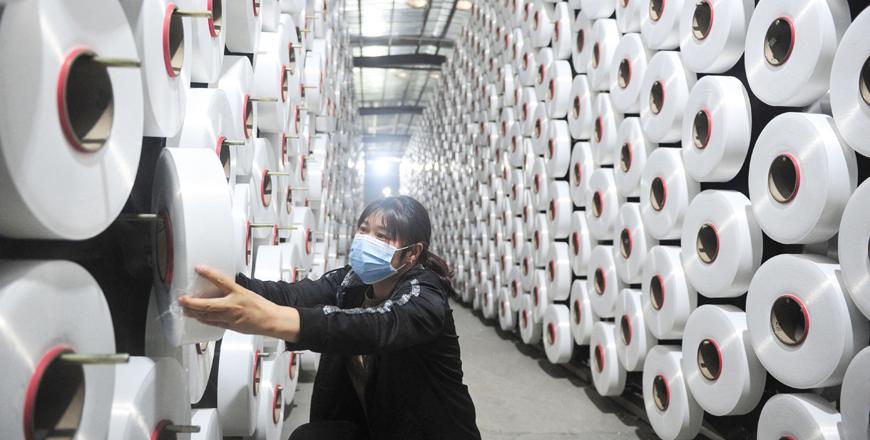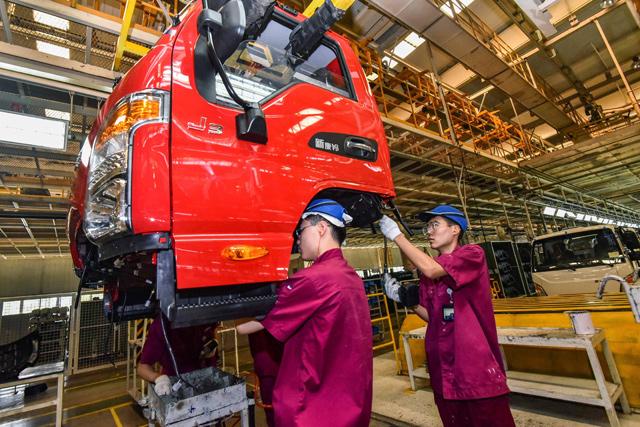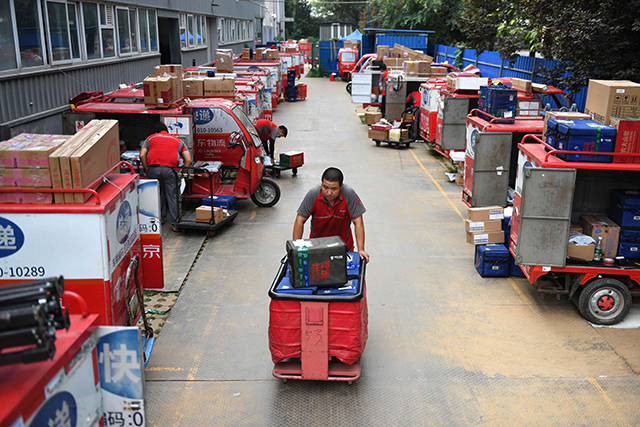You are here
China economy accelerates in Q1 but virus stalks outlook
By AFP - Apr 18,2022 - Last updated at Apr 18,2022

This photo taken on Sunday shows an employee working at a textile factory in Hangzhou in China's eastern Zhejiang province (AFP photo)
BEIJING — China's economic growth accelerated in the first quarter of the year to 4.8 per cent, official data showed on Monday, but the government warned of "significant challenges" ahead while massive COVID-19 lockdowns started to bite.
The world's second-biggest economy had lost steam in the latter half of last year with a property slump and regulatory crackdowns, pulling down growth.
But it exceeded expectations in the first three months of 2022, growing 4.8 per cent on-year, the National Bureau of Statistics (NBS) said, with Lunar New Year spending and factory production cajoling growth.
The weeks ahead, however, appear treacherous for the economy with Beijing's unrelenting zero-COVID approach to outbreaks clogging supply chains and locking down tens of millions of people — including in the economic dynamos of Shanghai and Shenzhen as well as the northeastern grain basket of Jilin.
Virus restrictions in March have already gouged at retail sales, as consumers shied away from shopping, and drove up unemployment.
"With the domestic and international environment becoming increasingly complicated and uncertain, economic development is facing significant difficulties and challenges," NBS spokesman Fu Linghui said on Monday.
The pandemic rebound — as well as the sanctions binding Russia's economy — ups the ante on officials to deliver Beijing's full-year growth target of around 5.5 per cent.
The target comes in a pivotal political year for President Xi Jinping who is eyeing another term in power at the Party Congress to be held this autumn.
The current virus outbreak is the worst since the peak of the first wave which emerged in Wuhan in late 2019, and the economy is beginning to weaken.
Industrial production growth eased to 5 per cent in March, NBS data showed, down from the January-February period.
Meanwhile, retail sales sank 3.5 per cent and the urban unemployment rate ticked up to a 22-month high of 5.8 per cent last month.
"March activity data suggests that China's economy slowed, especially in household consumption," Tommy Wu, lead China economist at Oxford Economics, said in a note.
'Worse to come'
China's government is trying to balance "minimising disruption against controlling the latest wave of COVID infections", Wu said, but he warned of a drag on economic activity into May or beyond.
Last week, carmakers including XPeng and Volkswagen warned of severe disruptions to supply chains and possibly even a halt on production completely if the lockdown on Shanghai's 25 million inhabitants persisted.
Already, goods are piling up at the world's busiest container port in Shanghai, prompting shipping giant Maersk to say it will stop taking new bookings for refrigerated containers into the city.
"Further impacts from lockdowns are imminent," said Iris Pang, chief economist for Greater China at ING.
As Shanghai struggles to rein in an outbreak that has seen tens of thousands of daily cases, Pang said other cities may attempt to replicate Shenzhen's success in reopening swiftly by resorting to strict measures with just a few COVID patients.
The southern tech powerhouse went into full lockdown for almost a week in March, but has since eased restrictions.
Julian Evans-Pritchard of Capital Economics cautioned that "the worst is still to come".
Fu of the NBS warned of high commodity prices on Monday with the Russia-Ukraine conflict leading to a decline in the availability of commodities such as corn and wheat.
Although China's central bank has announced a reserve ratio cut, lowering the amount of cash banks must hold in a push to support small businesses, experts say officials were taking a restrained approach to stimulus.
But economists expect officials will eventually publish a growth figure consistent with official targets, as part of doubts that the numbers may be massaged for political reasons.
Related Articles
BEIJING — Chinese factory activity stabilised in June, data showed on Wednesday, but output was hit by supply shortages of key commodities a
BEIJING — China's retail sales growth weakened last month, official data showed on Monday, missing forecasts as demand remains muted in the
BEIJING — China's economy returned to growth in the second quarter following a coronavirus contraction, with President Xi Jinping promising















